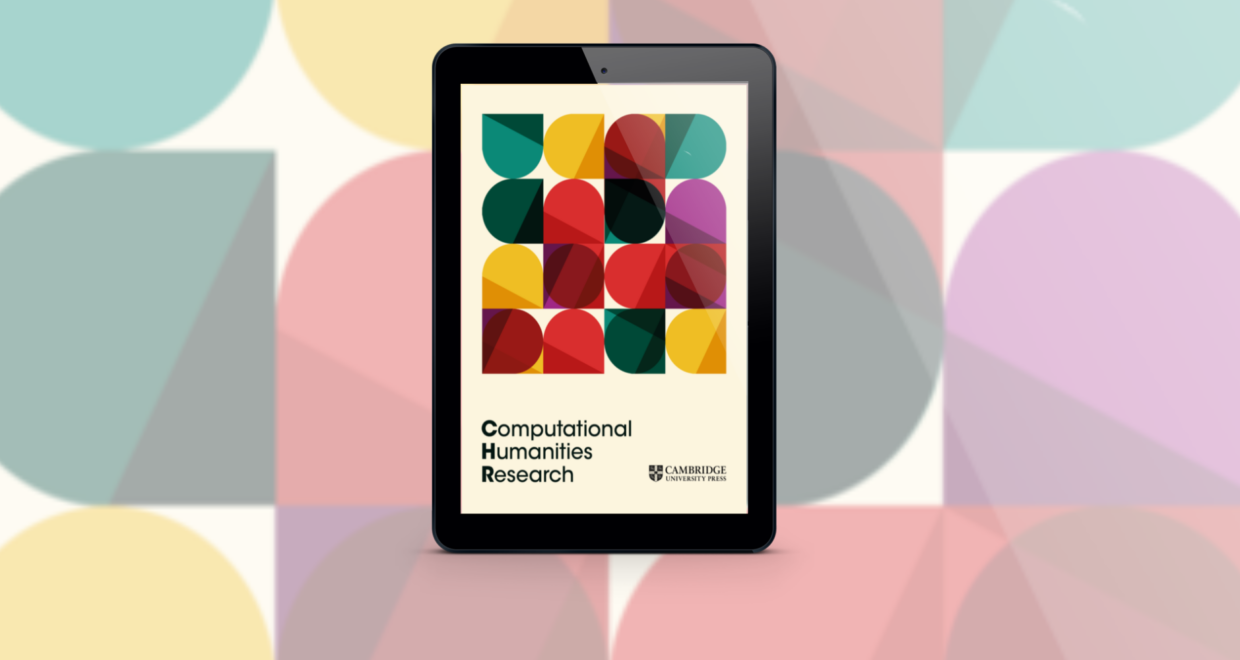‘Computational Humanities Research’: A new open access journal at the intersection of computational methods and the humanities
We are delighted to launch Computational Humanities Research. The journal offers a new venue for cutting-edge scholarship at the intersection of computational methods and the humanities. We are excited to build this new scholarly conversation together with scholars from around the world and to reach a global audience through Gold Open Access.
One exciting innovation of the journal is the decision to organize Associate Editors by method. We want the structure of the editorial board to reflect how this journal is centering computational methods in humanities research, broadly defined. While humanities insights remain central, we hope the decision makes space for scholars eager to include technical details that will assume that the reviewers have a baseline understanding of the background behind existing methods.
Our vision is to establish a leading platform for interdisciplinary scholarship that integrates computational techniques with data and subject-matter knowledge from traditional humanities disciplines. The journal seeks to enhance understanding of cultural, social, and historical phenomena while also providing a space to discuss new, clever, and unexpected computational approaches that do not have a clear home in existing humanities and science journals.
Our mission is to:
- Promote interdisciplinary collaboration: Encourage collaboration among researchers from diverse fields, including computer science, data science, and various humanities disciplines, to explore methodologies and share insights.
- Elevate computational humanities methods: Focus on the development and application of computational techniques that augment traditional humanities research, thereby expanding the scope and depth of analysis.
- Support Open Science: Advocate for open source, open data and transparent research methodologies, ensuring that findings are reproducible and accessible to the broader academic community and beyond
- Be driven by values: Including inter/trans-disciplinarity, innovation, diversity and inclusivity, as well as transparency and reproducibility.
We aim to contribute significantly to the evolving landscape of computational humanities and scholarship.
As with all journals, there will be opportunities to expand and shift directions. There will also be oversights. We welcome feedback, ideas, and proposals for themed issues. Our aim is to build an inclusive community that highlights work globally, which is an ongoing process and one that we are excited to pursue.
A special thank you to Jess Miorini and the team at Cambridge for shepherding the launch of the journal.
Kristoffer Nielbo is a Professor of Humanities Computing and Director of the Center for Humanities Computing at the Department of Culture, Cognition, and Computation, Aarhus University, Denmark. His research focuses on computational methods and large-scale data analysis to model the dynamic structures of sociocultural systems. Nielbo’s expertise spans quantitative text analysis, fractal analysis of narrative structures, dynamic modeling of author profiles, change detection in media, and machine learning for decision support systems. By integrating computational techniques with humanities research, his work pushes the boundaries of interdisciplinary inquiry, fostering innovation in interactive computing, data-driven methodologies, and collaborative tool development.
Lauren Tilton is E. Claiborne Robins Professor of Liberal Arts and Professor of Digital Humanities in the Department of Rhetoric and Communications at the University of Richmond. She directs the Distant Viewing Lab and the Center for Liberal Arts and AI. Her research focuses on analyzing, developing, and applying digital and computational methods to the study of 20th and 21st century visual culture with the generous support of the ACLS, National Endowment for the Humanities, and Mellon. Her most recent works include the co-authored Distant Viewing (MIT Press, 2023) and edited volume Computational Humanities (Minnesota, 2024). She is currently the co-President of the ACH: Association for Computing in the Humanities, the scholarly association for digital humanities in the United States, and President-Elect of ADHO: Association of Digital Humanities Orgnaizations.
Folgert Karsdorp, PhD, is a senior researcher in Computational Humanities and Cultural Evolution at Amsterdam’s Meertens Institute of the Royal Netherlands Academy of Arts and Sciences. He specializes in the quantitative analysis of cultural change, focusing on developing methods to describe as well as infer dynamics of change. Additionally he works on measuring and understanding the emergence of cultural diversity and complexity. His research critically examines and addresses biases in these quantifications, drawing on computational models from Machine Learning, Cultural Evolution, and Ecology. His interdisciplinary approach bridges traditional humanities with new computational methods, leading to publications in prestigious journals including Science and PLOS Computational Biology. Karsdorp is one of the founders of the international conference on Computational Humanities Research (CHR). Beyond his research, Karsdorp is passionate about education, particularly in teaching computer programming for Humanities applications. He co-authored Humanities Data Analysis: Case Studies with Python (Princeton University Press, 2021), a comprehensive guide to utilizing Python for data analysis in Humanities research.






